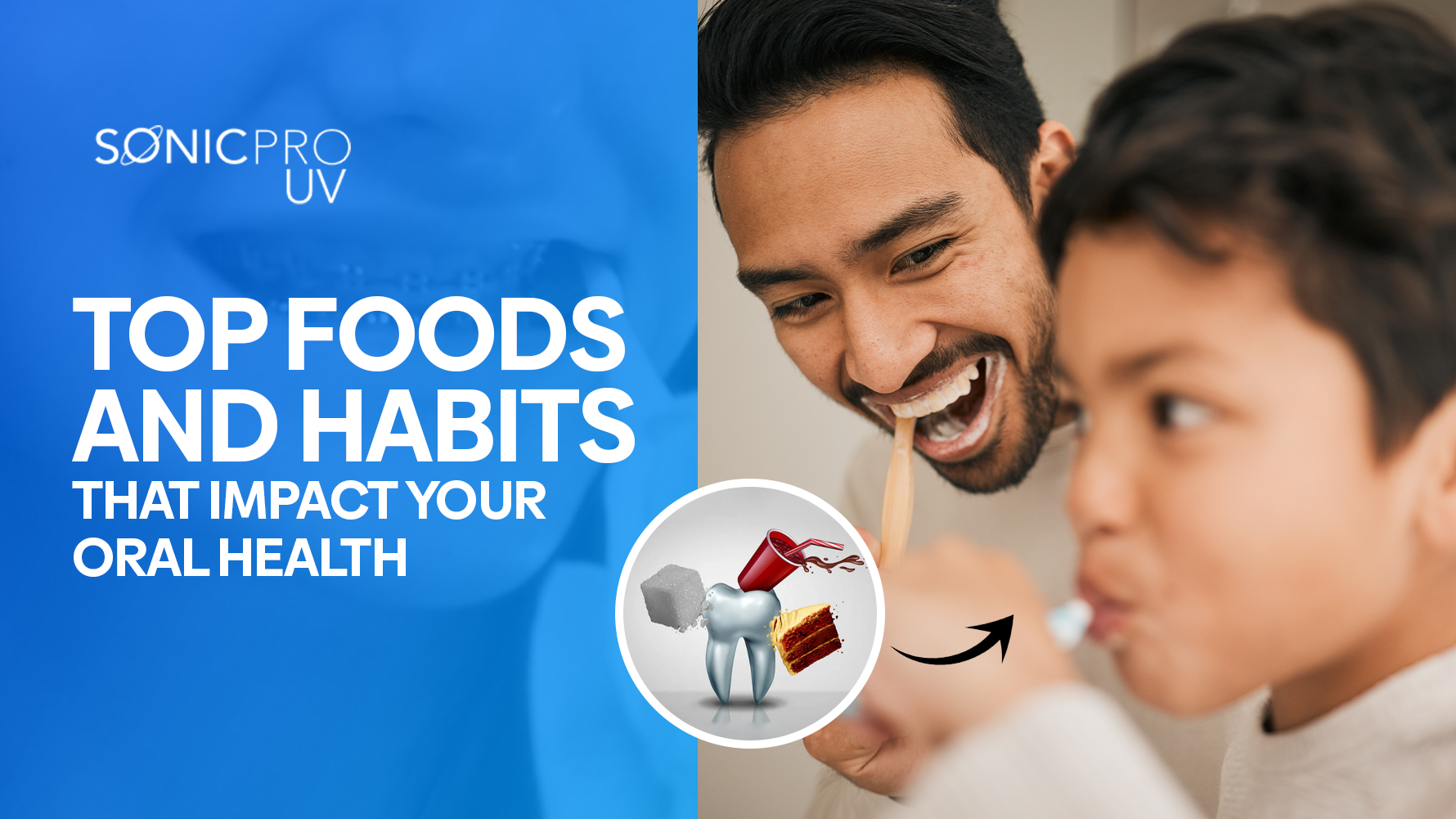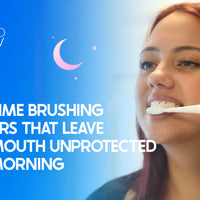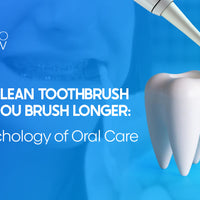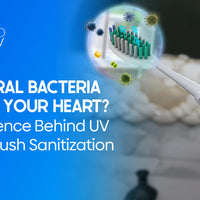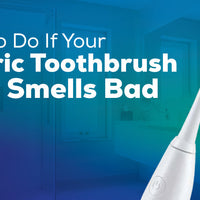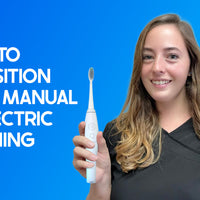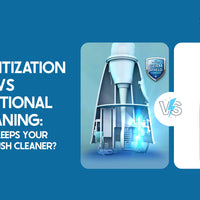Summary
- Sugary, acidic, sticky, and hard foods can weaken enamel and fuel tooth decay.
- Tooth-friendly foods like dairy, leafy greens, and crunchy veggies strengthen enamel and gums.
- Daily habits like teeth grinding, nail biting, or using your teeth as tools can damage your smile over time.
- Drinking water regularly helps rinse away bacteria, neutralize acids, and support saliva production.
- Brushing properly with a soft or electric toothbrush, like SonicPro UV, improves plaque removal and hygiene.
Have you ever thought about how much your daily food choices and habits shape the health of your teeth and gums? Many people assume that brushing and flossing are enough to keep their smile strong, but the truth is that what you eat and the habits you keep play just as big of a role. Certain foods can weaken enamel, encourage cavities, and irritate gums, while others provide the nutrients and protection your mouth needs to thrive. Similarly, small daily behaviors can either protect or damage your teeth over time.
The key takeaway is simple: your diet and habits directly influence your oral health, affecting everything from tooth decay to gum disease and even your overall well-being. By learning which foods and habits to avoid and which to embrace, you can protect your smile for the long run.
What Are the Worst Foods for Your Teeth?

Some foods are especially harmful to your teeth because they create the perfect environment for bacteria to thrive or because they weaken enamel directly. Here are the top culprits.
Sugary Foods & Drinks
Sugar may taste great, but it is your teeth’s worst enemy. When you eat sugary snacks or sip sweet drinks, the bacteria in your mouth feed on the sugar and produce acids. These acids attack your enamel, slowly wearing it down. The more frequently you expose your teeth to sugar, the more opportunities bacteria have to create cavities. Think of soda, candy, pastries, and even fruit juices. They all leave behind sugar that lingers on your teeth and fuels decay.
Acidic Foods and Beverages

Citrus fruits, tomatoes, wine, and carbonated drinks are highly acidic. These acids weaken the protective outer layer of your teeth, making them more vulnerable to sensitivity and decay. A little citrus now and then is fine, but frequent consumption wears enamel away. One important tip is to avoid brushing immediately after eating acidic foods because enamel is softer at that time. Waiting at least 30 minutes before brushing allows your enamel to re-harden, reducing the risk of damage.
Starchy & Sticky Foods
Chips, bread, pasta, and other starchy foods might not seem harmful at first glance, but starches break down into sugars once they mix with saliva. Sticky foods like caramel or dried fruit cling to teeth and prolong acid attacks because they are difficult to rinse away. When these foods linger in your mouth, they create a long-lasting environment where bacteria can thrive.
Hard Foods & Alcohol
Chewing on ice, hard candies, or popcorn kernels can cause tiny cracks in your teeth or even full fractures. Alcohol poses a different kind of threat. It dries out your mouth by reducing saliva production. Since saliva helps neutralize acids and wash away bacteria, a dry mouth increases your risk of decay and gum disease.
Best Foods for Stronger Teeth & Healthier Gums
Not all foods are harmful. Some actually help strengthen your teeth, neutralize acids, and keep your gums healthy. Adding more of these into your diet can make a big difference.
Dairy Products
Milk, yogurt, and cheese are packed with calcium and phosphorus, both of which strengthen enamel. Cheese is especially beneficial because it also helps neutralize acid in the mouth. A piece of cheese after a meal can balance your oral environment and reduce cavity risk.
Crunchy Fruits & Vegetables
Apples, carrots, celery, and cucumbers do more than provide vitamins. Their fibrous texture acts like a natural toothbrush, scrubbing away food particles and plaque as you chew. They also stimulate saliva flow, which helps rinse away harmful bacteria and neutralize acids.
Leafy Greens & Lean Proteins
Spinach, kale, and other leafy greens provide essential vitamins and minerals such as folic acid, which supports gum health. Lean proteins like chicken, fish, and eggs deliver phosphorus and other nutrients that strengthen enamel and bones. A balanced diet with these foods supports not only your teeth but also your overall health.
Water
Staying hydrated is one of the simplest but most powerful ways to protect your oral health. Water helps wash away food particles, dilute acids, and keep saliva production steady. If you drink tap water with fluoride, you get an added benefit since fluoride helps remineralize enamel and strengthen teeth against decay.
Daily Habits That Sabotage Oral Health
Beyond diet, daily habits play a huge role in maintaining or damaging your teeth and gums. Some habits may seem harmless but can create long-term issues.
Poor Oral Hygiene
Poor toothbrush hygiene and inconsistent brushing are a recipe for cavities and gum disease. Plaque is a sticky film of bacteria that produces acids which attack enamel and irritate gums. Skipping brushing or flossing makes matters worse by allowing bacteria to thrive. For example, skipping brushing before bed leaves food particles and bacteria on teeth overnight, creating the perfect environment for decay and gum inflammation.
Teeth Grinding
Grinding your teeth, often during sleep, gradually wears down tooth enamel and can cause cracks or fractures. Over time, this habit can lead to sensitivity, jaw pain, and even headaches. Mouthguards are often recommended to protect teeth if grinding is a problem.
Using Teeth as Tools
It may seem convenient to open packages or bottles with your teeth, but doing so puts enormous pressure on them. This habit can chip enamel or cause breaks. Scissors or proper tools are always the safer option.
Smoking & Tobacco Use

Tobacco not only stains your teeth but also accelerates gum disease and increases the risk of tooth loss. The dangers extend beyond your mouth as smoking and chewing tobacco are linked to oral cancer.
Nail-Biting & Chewing Ice
These unconscious habits may feel harmless, but they put unnecessary stress on teeth and can cause small cracks over time. Stress-relief alternatives such as fidget tools or sugar-free gum are safer ways to break the habit.
Skipping Dental Checkups
Many people avoid the dentist until something hurts, but by then damage is often advanced. Regular dental checkups and cleanings are critical because they allow early detection of cavities, gum issues, and other problems that are easier to fix when caught early.
Essential Habits for a Lifetime of Healthy Teeth
While avoiding harmful foods and habits is important, adding positive daily routines will help protect your smile for years to come.
Hydration Strategies: Drink plenty of water throughout the day to keep your mouth hydrated and bacteria under control. Aim for consistent water intake instead of relying on sugary or acidic drinks.
Smart Snacking Choices: Instead of reaching for chips or candy, choose snacks like cheese cubes, apple slices, or nuts that help support your oral health.
Proper Brushing Techniques: Use a soft-bristled toothbrush and brush gently for two minutes twice a day. Position your toothbrush at a 45-degree angle and use circular motions rather than aggressive scrubbing. An electric toothbrush can make this even easier. Modern electric toothbrushes remove more plaque than manual ones and help maintain consistent pressure and timing. For added hygiene, SonicPro UV’s UV technology keeps your brush fresh, ensuring you are keeping your brush germ-free.
The Power of Professional Care: Routine dental visits are essential. Dentists can clean areas you miss at home and spot early signs of cavities, gum disease, or enamel wear before they become major problems.
Conclusion
Your diet and daily habits are just as important as brushing when it comes to keeping your teeth and gums healthy. Sugary, acidic, sticky, and hard foods can damage enamel, while nutritious options like dairy, crunchy vegetables, leafy greens, and water can strengthen and protect your teeth. Harmful habits such as smoking, grinding, or skipping dental visits sabotage oral health, but positive practices like proper brushing, hydration and professional care build a strong foundation for lifelong oral health.
Read More Articles:
- 10 Benefits of Using an Electric Ultraviolet Toothbrush
- 5 Reasons Why SonicPro UV is the #1 Electric Toothbrush for Kids
- 5 Surprising Health Benefits of the SonicPro UV Toothbrush
- Manual vs. electric toothbrush: which is better?
- How to Save Money at the Dentist with an Ultraviolet Toothbrush?
- Top Tips for Cleaning Your Electric Toothbrush for Cavity Prevention

